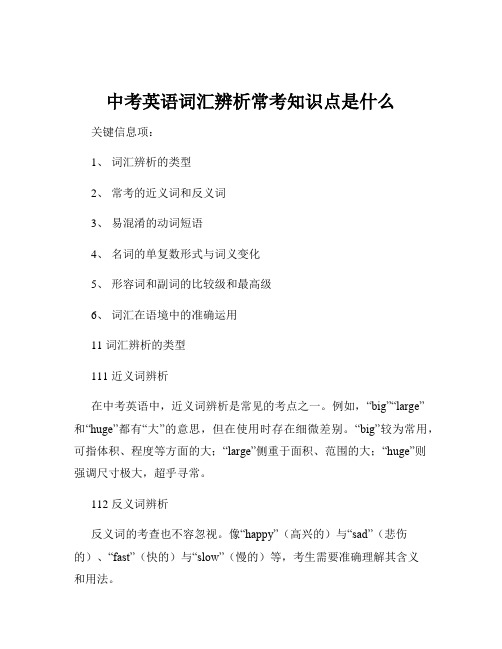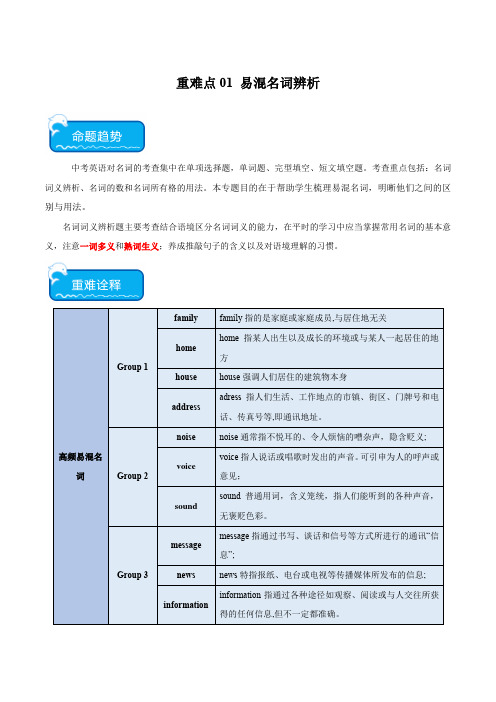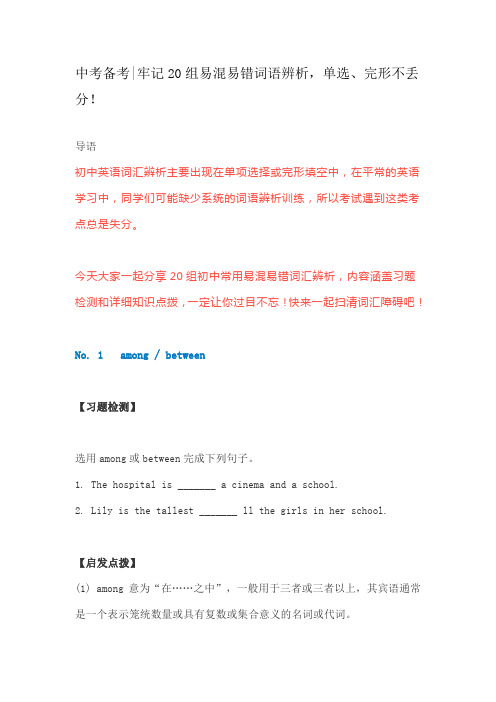中考英语易混词汇辨析
英语中考常考易混词汇辨析(G-M)

2022 中考常考易混词汇辨析(G-M开头)(配练习+答案)9. jeans/ trousers / pants/ shoes 等成双成对的词的主谓一致问题10. 【参加】的词组Practice1. The sun is shining. Don't look at the sun.A.gold; straightB.golden; straightlyC.golden; straightD.gold; straightly2. —Do you come from ?—No. But I can speak well.A.Germany; GermanB.German; GermanyC.Germany; GermanyD.German; German3. Students will make progress if they a subject.A.be made ofB.be made fromC.be made up ofD.be made in4. The kite is paper, and the paper is trees.A.made of; made fromB.made from; made ofC.made of; made inD.made from; made in5. It's getting dark, let's , shall we?A.go on to workB.go on workingC.to go on workD.to go on working6. Students to study. Their parents to pick them up.A.go to the school; go to the schoolB.go to school; go to schoolC.go to the school; go to schoolD.go to school; go to the school7. Boys and girls, time is up, please check your name and your papers.A.hand outB.hand upC.hand inD.hand down8. The hunter the fox, took off its skin and it on the tree.A.hung; hangedB.hung; hungC.hanged; hangedD.hanged; hung9. Our teacher often tells us different events that have strong influence on China.A.historic; historyB.historical; historicC.history; historyD.history; historic10. In order to have a better understanding of those places of interest, she read some books before the visit.A.historical; historicalB.historical; historicC.historic; historicalD.historic; historic11. Why don't you us to the speech contest?A.join; joinB.take part in; take part inC.take part in; joinD.join; take part in12. A is a long journey on a ship or in a spacecraft.A.tourB.voyageC.tripD.continent13. The boy's mother is . He has to look after his mother at home.A.bad; sickB.ill; badC.ill; sickD.sick; ill14. This year's Government Work Report many issues economic growth, environmental protection, etc.A.includes; includingB.include; includingC.is included; includeD.including; include15. Thousands of people lost their in the earthquake, so we should value our daily .A.lives; lifeB.life; lifeC.lives; livesD.life; lives16. Independence does not mean (shut)the door to the world.本章答案1-5 BACAB 6-10 DCDDC 11-15 DBCAA 16. shutting。
中考易混清词汇unusual

中考易混清词汇unusual中考英语考试中,经常会涉及一些词汇的辨析,有些单词很相似,容易混淆。
本文将重点介绍一组常见的易混清词汇——"unusual","ordinary"以及"unique"。
希望通过本文的解析,能够帮助大家更好地理解和运用这些词汇。
一、unusual"unusual"是一个形容词,意思是“不寻常的”或者“罕见的”。
它用来描述与平常不同的、不寻常的事物或情况。
当我们遇到一些不同于日常经历的事情时,我们可以使用"unusual"这个词。
比如,一个在街上戴着奇特帽子的人,我们可以说他穿着不寻常。
再比如,突如其来的雨雪是一个不寻常的天气现象。
二、ordinary"ordinary"也是一个形容词,意思是“普通的”或者“常见的”。
它用来描述那些我们日常生活中接触最多的事物和情况。
与"unusual"相比,"ordinary"强调的是符合常规、常见的特点。
比如,我们每天都会见到普通的公交车,普通的食物,这些都属于ordinary事物。
三、unique"unique"同样是一个形容词,意思是“独特的”或者“独一无二的”。
它用来形容那些独一无二的事物,与其他事物不同。
与"unusual"相比,"unique"更加强调某个事物的独特性,指的是只有一个或者很少几个。
比如,著名画家达·芬奇的画作就是unique的,因为没有人能够完全复制他的作品。
在使用这些词汇的时候,我们需要注意它们的搭配和用法。
比如,我们可以说一个人的外表很unusual,但不可以说他很unique,因为unique的意思是"独一无二的",用来形容事物而不是人。
另外,我们可以说一个事物是ordinary和unusual的,但不可以说它是ordinary和unique的,因为这两个词意思相对矛盾。
中考英语重点词汇复习: 辨析Each Every Either Neither

辨析Each Every Either NeitherEach和Every,Either和Neither都是很容易混淆的词,也是考试中常遇到的考点,更是同学们感到迷惑容易失分的地方。
其实只要掌握了基本用法和常用句型,还是很好区分的。
下面结合例句谈谈这几个词的用法。
前两个都表示每一个,每个的,各自的,区分起来有点难度;Either是或者……或者……,neither是两者都不……。
These distributive words are normally used with singular nouns, and are placed before the noun.这些词通常与单数名词连用,并放在名词之前。
Each, either and neither can be used with plural nouns but must be followed by of.Each, either 和 neither 与复数连用时后面必须接 of。
Each is a way of seeing the members of a group as individuals.Each是针对整体中的每个个体而言。
Each child received a present./Each of the children received a present.每个孩子都可以得到一份礼物。
Every is a way of seeing a group as a series of members.Every是针对整体中的一系列成员而言。
Every child in the world deserves affection.全世界的孩子都应该受到爱护。
It can also express different points in a series, especially with time expressions.尤其在时间的表达上,every也可以表示一系列不同的点。
中考英语词汇辨析常考知识点是什么

中考英语词汇辨析常考知识点是什么关键信息项:1、词汇辨析的类型2、常考的近义词和反义词3、易混淆的动词短语4、名词的单复数形式与词义变化5、形容词和副词的比较级和最高级6、词汇在语境中的准确运用11 词汇辨析的类型111 近义词辨析在中考英语中,近义词辨析是常见的考点之一。
例如,“big”“large”和“huge”都有“大”的意思,但在使用时存在细微差别。
“big”较为常用,可指体积、程度等方面的大;“large”侧重于面积、范围的大;“huge”则强调尺寸极大,超乎寻常。
112 反义词辨析反义词的考查也不容忽视。
像“happy”(高兴的)与“sad”(悲伤的)、“fast”(快的)与“slow”(慢的)等,考生需要准确理解其含义和用法。
113 形似词辨析一些词汇在拼写和发音上相似,但词义完全不同。
如“quite”(相当)和“quiet”(安静的),“accept”(接受)和“except”(除之外)。
12 常考的近义词和反义词121 常见的近义词“look”“see”“watch”都与“看”有关,但“look”强调看的动作,“see”侧重于看的结果,“watch”则常指观看活动、比赛等。
“spend”“cost”“take”“pay”都有“花费”之意,“spend”主语是人,“cost”主语是物,“take”通常用于“it takes sb some time to do sth”句型,“pay”常与“for”搭配。
122 常见的反义词“good”与“bad”、“right”与“wrong”、“many”与“few”、“much”与“little”等反义词在中考中经常出现,需要考生清晰掌握其用法和区别。
13 易混淆的动词短语131 由“put”构成的动词短语“put on”(穿上)、“put off”(推迟)、“put up”(张贴;举起)、“put away”(收拾好)等,这些短语的含义和用法各不相同。
2024中考备考英语重难点01 易混名词辨析(解析版)

重难点01 易混名词辨析中考英语对名词的考查集中在单项选择题,单词题、完型填空、短文填空题。
考查重点包括:名词词义辨析、名词的数和名词所有格的用法。
本专题目的在于帮助学生梳理易混名词,明晰他们之间的区别与用法。
名词词义辨析题主要考查结合语境区分名词词义的能力,在平时的学习中应当掌握常用名词的基本意义,注意一词多义和熟词生义;养成推敲句子的含义以及对语境理解的习惯。
(2023中考真题建议用时:15分钟)1.(2023·辽宁鞍山·中考真题)—Why does Mary get good grades each time?—I think that’s because she puts most of her ________ into her schoolwork.A.energy B.practice C.exercise D.process2.(2023·内蒙古·中考真题)—The model plane is wonderful! How did you make it?—It’s easy. Follow the ________ and you can do it, too.A.discussion B.education C.conditions D.instructions3.(2023·江苏淮安·中考真题)As a student, you should keep a ________ between your schoolwork and yourhobbies.A.diary B.record C.secret D.balance4.(2023·湖北襄阳·中考真题)—Mr. Fan runs at least half an hour every day.—What a good ________! No wonder he looks healthy.A.habit B.question C.article D.prediction5.(2023·湖北黄石·中考真题)—Could you tell me the ________ of making such tasty dumplings?—Well, I just follow the steps on Tiktok.A.cost B.method C.time D.menu6.(2023·内蒙古呼和浩特·中考真题)High-speed trains are seen as one of the new Four Great ________ of China.A.Inventions B.Advantages C.Environments D.Technologies7.(2023·江苏常州·中考真题)After she was brought back to China, the sick giant panda Ya Ya received good ________ in her new home and got better.A.education B.communication C.entertainment D.treatment8.(2023·江苏南通·中考真题)—________ are easily made, but not easily kept.—That’s true. Once you make one, be sure to keep it.A.Speeches B.Decisions C.Promises D.Suggestions9.(2023·江苏镇江·中考真题)The main ________ of the cities along the Grand Canal (大运河) is history and culture.A.attraction B.pollution C.invention D.situation10.(2023·青海·中考真题)A taxi driver prevented (阻止) an _________ when he saw a car with serious problems travelling across Huangnan.A.accident B.interview C.advertisement11.(2023·山东青岛·中考真题)Before flying a plane, a ________ must take a lot of training.A.policeman B.musician C.nurse D.pilot12.(2023·湖北十堰·中考真题)—How did you fix up the machine, dad?—It’s easy. I just followed the ________.A.instructions B.inventions C.interviews D.influences13.(2023·江苏徐州·中考真题)Of all the ________, I love summer best.A.seasons B.subjects C.colours D.hobbies14.(2023·辽宁丹东·中考真题)Mary’s parents are interested in ________, so they often take her to concerts.A.sports B.music C.science D.movies15.(2023·江苏宿迁·中考真题)—The girl’s beautiful pronunciation caught our ________ in yesterday’s English speech competition.—Yes, many students couldn’t help cheering for her.A.condition B.attention C.invention D.position16.(2023·江苏泰州·中考真题)—Good news! The Chinese women table tennis team won a gold and a silver again.—Great! No matter who wins the medals, it is the ________ of our country.A.price B.pioneer C.pride D.pain17.(2023·黑龙江牡丹江·中考真题)Although our school life is a little busy, it is full of ________.A.pain B.sadness C.laughter18.(2023·四川遂宁·中考真题)—Which movie would you like to watch, Tracy?— Um…it’s hard to make a ________.A.survey B.choice C.call D.wish19.(2023·辽宁·中考真题)Thanks to the teacher’s help, I solved all the ________ easily.A.chances B.problems C.habits D.grades20.(2023·辽宁营口·中考真题)Scientists who are full of ________ always come up with new ideas and bring great changes to our life.A.instruction B.instrument C.invention D.introduction1.A【详解】句意:——为什么玛丽每次都取得好成绩?——我想那是因为她把大部分精力都放在功课上了。
英语中考牢记20组易混易错词语辨析

中考备考|牢记20组易混易错词语辨析,单选、完形不丢分!导语初中英语词汇辨析主要出现在单项选择或完形填空中,在平常的英语学习中,同学们可能缺少系统的词语辨析训练,所以考试遇到这类考点总是失分。
今天大家一起分享20组初中常用易混易错词汇辨析,内容涵盖习题检测和详细知识点拨,一定让你过目不忘!快来一起扫清词汇障碍吧!No. 1 among / between【习题检测】选用among或between完成下列句子。
1. The hospital is _______ a cinema and a school.2. Lily is the tallest _______ ll the girls in her school.【启发点拨】(1) among意为“在……之中”,一般用于三者或三者以上,其宾语通常是一个表示笼统数量或具有复数或集合意义的名词或代词。
(2) between一般指两者之间,其宾语通常是表示两者概念的名词或代词,或由and连接的两个具体的人或物。
between有时也可表示多者之中的“两两之间”。
如:Switzerland lies between France, Germany, Austria and Italy.Key:1. between2. amongNo. 2 lay / lie【习题检测】用lay或lie的适当形式完成句子。
1. I _______ the table when my mother cooked the meal.2. John was ill and _______ in bed all morning.【启发点拨】(1) lay作动词,可意为“摆放(餐桌)”,其过去式与过去分词均为laid,现在分词为laying,常用于短语lay the table,意为“摆放餐桌”。
如:Tom was laying the table.(2) lie作动词,意为“躺;平躺”时,过去式为lay,过去分词为lain,现在分词为lying。
中考英语易混淆英语词汇辨析名词代词连词

中考英语易混淆英语词汇辨析:名词-代词-连词一、容易混淆的名词[考试说明] 了解名词在句中所充当的成分,理解并能区别所学的可数名词和不可数名词;熟练掌握所学可数名词复数形式的构成,在口语和书面语的表达中正确运用;掌握物质名词及其数量的表达方法;了解专有名词的概念及一般用法;熟练掌握所学名词所有格的用法;了解集合名词和抽象名词的概念及一般用法。
1. job & work[误] I’m busy today, for I have a lot of jobs to do.[正] I’m busy to day, for I have a lot of work to do.job意思是a piece of work,指已做或要做、应做的具体的某种工作,实际含义是“职业”,而work通常指抽象意义上的工作,是不可数名词,也可指“工作场所”。
2. by train & change trains[误] We came here by the train.[正] We came here by train.[正] We came here on/in the train.[误] We have to change the train at the next station.[正] We have to change trains at the next station.train意思是“火车”,表示“乘火车”,用by train或on/ the train,表示“换火车”,train必须用复数形式,且前面不加限定词。
二、容易混淆的代词:[考试说明] 熟练掌握人称代词主格、宾格形式及基本用法,在口语和书面语的表达中正确运用;掌握形容词性物主代词和名词性物主代词的基本用法;掌握反身代词作为宾语和同位语的基本用法;熟练掌握指示代词和疑问代词的基本用法.1. either & each & none & neither & both & all & some[误] Either of the books are good.[正] Either of the books is good.either/ each / none / neither of+复数名词或代词作主语时,谓语动词用单数, 其中neither的也可用复数;both/ all /some of+复数名词或代词作主语时,谓语动词用复数三、容易混淆的连词:[考试说明] 掌握并列连词(如:and、but、or)和从属连词(如:when、if、that等)的基本用法。
中考英语易混词汇辨析:fine, nice, good, well

词汇辨析:fine, nice, good, well本站原创| 2015-08-26分享到:四者都可用作形容词表示"好"之意,但前三者既可作表语又可作定语,而后者仅用作表语。
主要区别在于:(1) fine指物时表示的是质量上的"精细",形容人时表示的是"身体健康",也可以用来指"天气晴朗"。
例如:Your parents are very fine. 你父母身体很健康。
That's a fine machine.那是一台很好的机器It's a fine day for a walk today.今天是散步的好时候。
(2)nice主要侧重于人或物的外表,有"美好","漂亮"的意思,也可用于问候或赞扬别人。
例如:Lucy looks nice. 露西看上去很漂亮。
These coats are very nice. 那些裙子很好看。
Nice to meet you. 见到你很高兴。
It's very nice of you. 你真好。
(3)good形容人时指"品德好",形容物时指"质量好",是表示人或物各方面都好的普通用语。
例如:Her son is a good student. 她儿子是一个好学生。
The red car is very good. 那辆红色小汽车很好。
(4)well只可用来形容人的"身体好",但不能作定语,它也能用作副词作状语,多放在所修饰的动词之后。
例如:I'm very well, thanks. 我身体很好,谢谢。
My friends sing well. 我的朋友们歌唱得好。
- 1、下载文档前请自行甄别文档内容的完整性,平台不提供额外的编辑、内容补充、找答案等附加服务。
- 2、"仅部分预览"的文档,不可在线预览部分如存在完整性等问题,可反馈申请退款(可完整预览的文档不适用该条件!)。
- 3、如文档侵犯您的权益,请联系客服反馈,我们会尽快为您处理(人工客服工作时间:9:00-18:30)。
墙上有一幅油画。
across
“横过,穿过”,指从……的一边到另一边
Be careful when you walkacrossthe road.
当你过马路的时候要小心。
through
“穿过”,强调从内部穿过
The river flowsthroughthe city from west to east.
London isamongthe greatest cities of the world.伦敦是世界上最大的城市之一。
another
指不定数目中的“另一个,又一个”
I don’t think the coat is good enough. Can you show meanotherone ?
Remember tobringyour book tomorrow.
记得明天把你的书带来。
take
“带走”,即把某物带到别的地方去
It’s going to rain. You’d bettertakean umbrella with you.
要下雨了。你最好带上一把雨伞。
fetch
“去取来某物”,它包括一个往返的过程
书架上有三十本书。五本是我的,其余是我爸爸的。
as
“当(在)……时候”,往往可与when或while通用,但它着重指主句和从句的动作或事情同时发生
I saw himashe was getting off the bus.
他下公共汽车的时候,我看见了他。
when
“当(在)……的时候”,主句和从句的动作或事情可以同时发生,也可以先后发生
他在上学的路上买了一支钢笔。
in the way
“挡路;妨碍”
Your car isin the way.你的小汽车挡路了。
because
因为
是连词,其后接句子
He didn’t comebecausehe was ill.
因为病了,他没来。
because of
是复合介词,其后接名词、代词、动名词、what从句等
起早一点你就会看到那位明星了。
a bit
He atea little/a bit offood this morning.
他今天早上就吃了一点食物。
as
像
作介词,意为“以……的身份;作为”
She worksasan interpreter in that company.
她在那个公司里担任翻译员。
like
已经
常用于肯定句,多与完成时和进行时连用。用于疑问句时表示问话人持怀疑、惊异的态度
I havealreadyfinished it.我已经做完了。
Is it Sundayalready?已经到星期天啦?
yet
通常用于疑问句和否定句,在疑问句中意为“已经”,在否定句中意为“还,尚未”
I haven’t learned ityet.我还不知道此事。
作介词,意为“像(如同)……一样,如……般的”
It’s notlikeyou to take offense.
你不像会发脾气的人。
after
在……之后
以过去为起点,表示过去一段时间之后,常用于过去时态的句子中
She wentafterthree days.
她是三天以后走的。
in
以现在为起点,表将来一段时间以后,常用于将来时态的句子中
我们学习中文、数学、英语和别的科目。
others
泛指“另外的人或物”,但不指其余的人或物的全部
Some like swimming,otherslike boating.
一些喜欢游泳,其他的一些喜欢划船。
the others
特指某一范围内的“其余全部的人或物”
There are thirty books on the bookshelf. Five are mine,the othersare my father’s.
我不同意你的意见。
agree on
表示“双方就……达成一致协议”
China and the U.S.A.agreed onthe place and time for the next meeting.
中美双方就下次会议的时间、地点问题达成了一致。
agree to
表示“同意,认同”,宾语一般为“计划、安排”
我恐怕帮不了你的忙。
be afraid of
后接名词/代词/动名词,意为“害怕做某事”
Iam afraid ofgoing out at night.
我害怕晚上出去。
big
侧重于表示物体的块头、重量,含有庞大、笨重的意思,其反义词是little
This coat is toobigfor her.
这件上衣对她来说太大了。
WebeatClass Four in the football match yesterday.昨天足球赛我们打败了四班。
Will you go andfetchsome water?
你去取一点水来,好吗?
carry
一般指“随身携带的细小物品”,此外还多用于汽车、火车等交通工具,意为“运载”的意思
The buscarriedme to the park yesterday.
昨天公共汽车把我载到了公园。
beat
后接的宾语一般为人或相当于人的名词,“打败……”
She will gointhree days.
她三天以后要走。
by the way
常用作状语,意为“顺便问一下,顺便说一下”
By the way, how old are you?
顺便问一下,你多大了?
on the way
“在……的路上”,后接名词时需加介词to
He bought a penon his/the way toschool.
我下午五点钟前到了那里。
I never saw himbefore.
我以前没见过他。
alone
“单独的”,只能作表语,强调数量单一
He livesalone, but he never feelslonely.
他独自一人生活着,但是他从不感到寂寞。
lonely
“孤独的,寂寞的”,强调心理感受
already
We have to put off the meetingbecause ofthe bad weather.
因为天气不好,我们不得不推迟会议。
be afraid that
如果后接宾语从句,意为“恐怕……”,用来表示带有歉意的回话或引出令人不满意的消息
I’m afraidI can’t help you.
under
所指范围较窄,往往表示在某物的正下方,其反义词是over
There is a catunderthe table.
桌子底下有只猫。
between
在……之间
用于表示双方之间的关系
There is a treebetweenthe two houses.
这两座房子之间有一棵树。
among
用于表示三个或三个以上之间的关系
我认为这件上衣不够好。你能给我看另一件吗?
the other
指两个中的“另一个”
He has two sons,oneis in Shanghai,the otheris in Beijing.
他有两个儿子,一个在上海,另一个在北京。
other
泛指“另外的”,修饰复数名词
We study Chinese, maths, English andothersubjects.
We allagreed toyour plan.
我们都同意你的计划。
a little
表示“一点儿”,都可修饰形容词、副词及其比较级,也可修饰动词
a little后可直接接不可数名词,a bit若修饰不可数名词必须用a bit of
Get upa bit/ a littleearlier, and you will see the star.
杯子里有一些水。
ago
以前
只用于一般过去时,表示从现在算起的一段时间以前
He died two yearsago.Fra bibliotek他是两年前去世的。
before
后接“时间点”,可用于任何时态;它也可放在“时间段”后,用于完成时或一般过去时
I got therebefore5 o’clock in the afternoon.
Please write to me when you reach Beijing.
你到北京后请给我写信。
get to
后接副词here,there,home时,要省略to
When did you get home yesterday?你昨天什么时候到的家?
agree with
表示“与……意见一致”
I don’tagree withyou.
It was rainingwhenwe arrived.
当我们到达的时候,正下着雨。
while
“当(在)……的时候”,表主句的动作或事情发生在从句中的动作或事情的进展过程之中。从句通常用进行时态
Please don’t talk so loudwhileothers are working.
别人在工作的时候,请勿大声讲话。
The earth is ahugeball.
地球是一个巨大的球。
below
在……的下面
所指范围较广,不一定在某物的正下方,其反义词是above
From the top of the mountain, we could see
